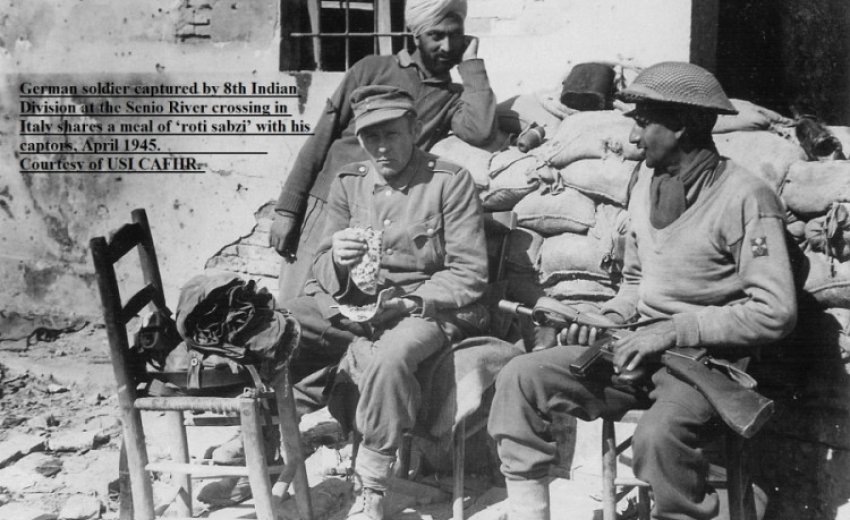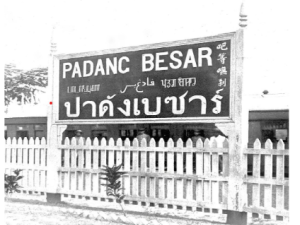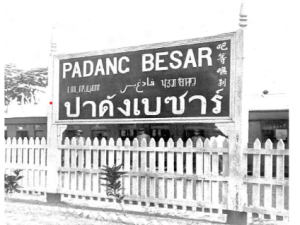The much needed boost to the Australian soldiers' spirits that Indian soldiers' help gave.
The Digger sniffed the savoury Sikh curry, and longed to taste it, but it was no go. One night a few of the boys got into the Sikh lines, and in some way or other the fingers of one of them were found in the pot. That settled it. Johnny Sikh gave the whole pot full to the Anzacs, who didn't forget the good taste for a long time.
Sing me to sleep, the bullets fall
Let me forget the war & all
Damp is my dugout, cold is my feet
Nothing but biscuits & bully to eat.
Popular soldier's song, circa 1918, recorded in the diary of Archie A. Barwick.
The entire Chapatti Movement left the British shaken to the core at one time ago. The mysterious Chapatti deliveries of 1857 turned out to be an effective weapon of psychological warfare against colonial rule. Perhaps it was the only time when a stack of freshly made chapattis became the messenger of the freedom struggle.
When we look at experiences of wartime through the prism of food we are constantly reminded of its power to divide us, but also to bring people together. So famously a "weapon" of WWI, food can also occupy a central role in the bridging of national, ethnic and religious divides.
In wartime, when cultural differences are amplified, food can be a potent reminder of shared humanity and reinforce a sense of belonging. Feeding is also a powerful act of love.
One hundred years after the first landing of troops at Gallipoli, Australians and New Zealanders hear very little about the Indian soldiers who played an important part in the fighting at Gallipoli. Yet there are many references to the Indians at Gallipoli in the letters and diaries of the Anzacs [Australian and New Zealand Army Corps]. "The true friendship between Indians and ANZAC's can be traced back to the fields of Gallipoli -- A friendship that must be commemorated on every ANZAC Day".
Every year, as ANZAC Day approaches, people become curious about ANZAC biscuits. Maybe it's because the thought of them is a delectable relief to the sombreness of that day and all that it represents. The ANZAC biscuit epitomises the link between food and WWI in national remembrance.
The importance of feeding an army properly has long been recognised as critical to its functioning. As Napoleon Bonaparte acknowledged: "An army really does march on its stomach". Yet it is well known that military personnel have often suffered from nutritional deficiencies.
During the war giving or exchanging food often across cultural divides was a potent act of caring, and relationships between soldiers were cemented over food. You would find ANZAC's coming and sharing the Indian soldiers' rations because their roti and daal (lentils) was far more palatable than the salted bully beef and biscuits.
The Australians were often hungry and thoroughly sick of the hard biscuits and bully beef that they had to eat too often. Some were developing a taste for Indian food.
Andrew Robertshaw, in his book 'Feeding Tommy' Soldiers wrote home complaining about the food and it was alleged that more fodder for horses was sent than food for men. Soldiers did complain, but Robertshaw suggests that this was more about the boredom of the food.
Leonard Bartlett (Signaller, 4th Battalion) writes of having "a pleasant little feed" with his friend Monty, and of a visit from a fellow soldier called Merrivale, who shared cake with him. Bartlett was involved in a lively network of exchange and barters among soldiers, and regularly visited the "Indian Camp" for "Chapattis" or Curry. A couple of days earlier he conducted a culinary experiment, 'Went over to Indian Camp in evening & got some Chapaties which went down well with marmalade'.
A great friendship was established between the Allied soldiers, with one story telling of the Australians eagerly accepting the offer of sharing rations with the Indian units - "Chupatties made by our Indian drivers were always more acceptable than those less dexterously made by ourselves, and proved a welcome change from biscuits".
Description
Kurdistan. 1919. Four members of `D' Troop, 1st Wireless Signal Squadron, Mesopotamian Expeditionary Force,
share a plate of round Indian bread chapattis offered to them by an Indian soldier in the outdoors.
The original caption reads: 'Chupatties made by our Indian drivers were always more
acceptable than those less dexterously made by ourselves, and proved a
welcome change from biscuits'. (Donor H. Dale) Photo Courtesy of Australian War Memorial
Description
Suleimaniyah, Mesopotamia. 1918-12-25. Members of No. 8 Station, 1st Wireless Signal Squadron,
Mesopotamian Expeditionary Force, enjoying Christmas dinner. Features of the menu were
venison and local wine donated by the sheikh of the valley. Note the round Indian bread
Chapattis being held up for the camera by two of the soldiers.
(Donor A. Skerritt) Photo Courtesy of Australian War Memorial
Stories tells us that even the most famous Australian Anzac John Simpson Kirkpatrick, used to stay with the Indian mule drivers in the battlefields of Gallipoli, because he preferred the fresh food cooked by the Indian troops much more than the bully beef that was supplied in the Australian rations. There are mentions of Simpson enjoying "chapattis" and freshly cooked curries.
The Anzacs called every Indian 'Johnny' and treated them like a brother, with the consequences that the Indians liked them even more. They served alongside each other from the very first to the very last day of the campaign.
Letters sent by Anzacs show that they had the highest regard for the courage and professionalism shown by the Indian troops. One Anzac even sent a photo that they posed with a Sikh soldier in the battlefields of Gallipoli, and sent it back home to introduce him to their families as a "Mate".
"Today is Sunday and I am sitting in my dugout this afternoon writing this. My dugout was on this side of the hill, over facing the sea and is in the midst of the Indian Camp (most likely Sikh). The Indians presented me with this dugout and every day they bring me something or other. Fred would have also eaten his meals with the Sikhs and wrote of them singing while they were cooking dhal and curry" .- Sergeant Charles Frederick Reeve A.I.F. Service Number 57
"The Indians are a fine lot of soldiers, cheerful, merry, and contented. They are very clean and good hearted. Will give our boys anything they have, and even sit down and make pan cakes for our boys, and are quite pleased if you take one and eat it. Any day, and all hours of the day and night, too, you will see Indians and Australians in the sea bathing, or washing their clothes". - Private G. Sherringham
"The Indian soldiers are fine men and we used to get a feed every night at Gallipoli from the battery Indians. Chappaties, a native very like pancake and sometimes curried vegetable " Lance Corporal M. W. Cowell writes from a hospital in Heliopolis.
"There is a small Indian camp here, part mountain battery and the remainder are in charge of the mule train that takes supplies to the different units. They are a fine lot of fellows and very enthusiastic in their work. We wanted some curry powder so my dug out mate asked them for some and offered him an exchange. He gave us some, but would not take anything. He said "No. Australian very good".- Private A. E. Weymouth.
Harold Arthur Browett 3rd Field Ambulance, Australian Army Medical Corps, describes the much needed boost to the Australian soldiers' spirits that Indian soldiers' help gave. Through a simple act of sharing tea and cake, connections were made between men who may never have met were it not for the war. Browett speaks of the 'binding friendship' that he felt existed between the two nationalities because of their shared experiences.
And so, whilst the fates of these men at that particular moment in time may have been intertwined by a shared sense of duty, in sacrificing side by side and in forming unprejudiced bonds of mate ship, they helped the Nation to understand a simple truth if people of myriad ethnicities could serve as equals abroad, then surely they could live as equals at home.
Harchand Singh Bedi
[email protected]
Resources:-
i) State Library of NSW. Soldiers Dairies
ii) 'Feeding Tommy' by Andrew Robertshaw
iii) Johnnie the Sikh and their Loyal Mules https://www.sikhnet.com/news/johnnie-sikh-and-their-loyal-mules
iv) Australian War Memorial
v) USI CAFHR
vi) Letter of appreciation for the assistance given to Australian Medical Corps by Indian Ambulance men at Gallipoli. British Library:-https://www.bl.uk/collection-items/appreciation-of-assistance-rendered-to-australian-medical-corps-by-indian-ambulance-men






